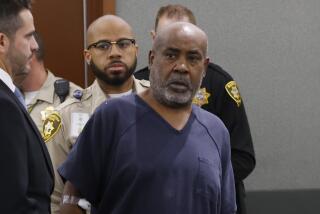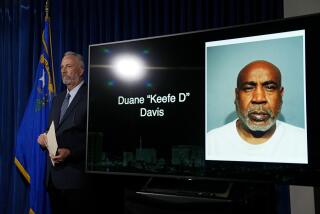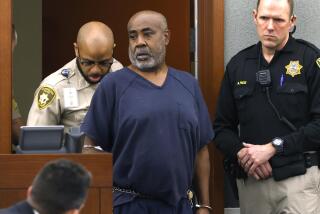Inquiry Rejects Claim Doris Duke Was Murdered
- Share via
Eighteen months after Doris Duke’s deathbed nurse alleged that the tobacco heiress was murdered with overdoses of drugs, the criminal investigation into Duke’s death has finally ended--finding “no credible evidence” she was murdered.
The highly publicized allegations by nurse Tammy Payette--that Duke’s former butler and doctor conspired to kill her with morphine and Demerol--threw into turmoil the heiress’s $1.2-billion estate and clouded the reputations of the butler, Bernard Lafferty, and one of Beverly Hills most prominent physicians, Dr. Charles Kivowitz.
But in letters to attorneys in the case, released Wednesday, the Los Angeles County district attorney’s office said “the results of the completed investigation disclosed no credible evidence of criminal homicide.”
A spokeswoman for the prosecutor’s office would not discuss the basis of the finding, or why it took so long to complete the investigation, conducted by the district attorney’s major crimes division and the Los Angeles Police Department’s robbery-homicide unit.
Those targeted by the allegations expressed relief at the “long-awaited” exoneration.
“Those who have attempted to reduce Miss Duke’s life to sordid events have not prevailed,” said Lafferty. “It is time to honor her memory by continuing her good works.”
“The results confirmed what we’ve known and believed all along . . . that there was no truth whatsoever to these allegations there was wrongdoing in the death of Doris Duke,” said Leonard Levine, the attorney for Kivowitz, an internist who treated Duke in the months leading up to her death Oct. 28, 1993 at Falcon Lair, her gated home above Beverly Hills. “The only question remaining is why these totally false allegations were leveled in the first place.”
The allegations surfaced in an affidavit submitted in Manhattan Surrogate’s Court in January 1995, amid the bitter probate fight that unfolded after Duke’s will was filed in New York, naming Lafferty as the individual executor of the estate. The will also gave the ponytailed former butler a central role in the charitable foundation that would dispense the fortune amassed by Duke’s father, James “Buck” Duke, founder of the American Tobacco Co.
But the money remained frozen amid legal wrangling and investigations after Payette charged that Duke “did not die of natural causes.”
One of six nurses who cared for Duke around the clock after she suffered a stroke, Payette said the heiress succumbed to “massive sedation.”
Payette asserted that as the famous patient lay ailing, Kivowitz declared one day “that it was time for Miss Duke to go.” And in a separate affidavit, Duke’s former cook--one of three servants challenging her will--claimed that he saw a security guard bring a parcel of morphine, and that Lafferty grabbed it and said, “Miss Duke is going to die tonight.”
Such portrayals were challenged by Kivowitz, a doctor to many Los Angeles celebrities.
In his testimony during the will fight, Kivowitz said he merely used the drugs to keep Duke comfortable after it was clear that she would not survive her illness.
“I remember very clearly a statement that she made that she was desperate, that she couldn’t go on living the way she was,” Kivowitz said in a deposition.
Near the end, Kivowitz said, he “increased the morphine level so she [would] not linger and suffer in any way.”
Fueled by allegations directed at Lafferty--who was branded a spendthrift alcoholic--the will fight soon involved some of the nation’s largest banks, law firms and armies of private detectives.
The conflict was not settled until May, when Lafferty agreed to resign as executor and play no role in the Doris Duke Charitable Foundation in return for $4.5 million in executor’s fees and the $500,000 yearly bequest provided for him by the heiress.
“It’s been the roughest time of my life. I never thought I’d see the end,” he said then. “They have tried to sacrifice me. They have tried to take away every piece of self-respect I have.”
In recent months, Lafferty said he welcomed the end of the police investigation because “the truth will really come out.”
The Los Angeles investigation, supervised by Deputy Dist. Atty. Sally Thomas, was conducted in top secrecy. But it was known that detectives reviewed Duke’s vast medical records and sought interviews with nurses and others with her in her final weeks.
One of the last people interviewed was a prominent friend of Duke, actress Elizabeth Taylor, whose favorite AIDS charity received a $1-million gift from the heiress shortly before she died. Taylor has stood by Lafferty as he, much like her, became a target of sensationalistic tabloid reports.
The closure of the criminal investigation means only one person will have gone to jail in the wake of the allegations: the nurse who made them.
After Payette leveled her charges, private investigators began following her and caught her pawning jewelry and other valuables from the homes of her wealthy Westside patients, including Duke and cosmetics magnate Max Factor. Payette was sentenced to eight years in prison for theft.
Even so, the New York lawyer who obtained her affidavit stood by the allegations Wednesday--and denounced the finding that there was “no evidence” of murder.
“That’s preposterous,” said Raymond J. Dowd, who represented the servants who sought to get Duke’s will invalidated. “There’s a very clear record that Doris Duke was murdered with massive overdoses. . . . I can’t imagine how a slam dunk [case] like this they could walk away from.”
Kivowitz’s attorney said he hoped the finding would put to rest the charges that have been repeated time and again in news reports and TV documentaries on Duke’s death.
“We’re thankful that they conducted such an exhaustive investigation because it confirmed what we knew all along, that at all times he provided Doris Duke with the finest medical care,” Levine said. “Each time the allegation was repeated, we had to point out that the source was a nurse who was a convicted felon and attorneys who had litigation against the estate . . . and had a great deal to gain.”
More to Read
Sign up for Essential California
The most important California stories and recommendations in your inbox every morning.
You may occasionally receive promotional content from the Los Angeles Times.










